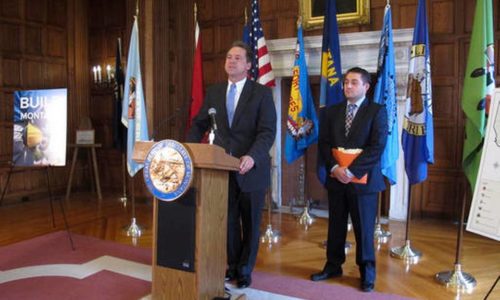Montana Gov. Steve Bullock proposed Tuesday to create new taxes on the wealthy and medical marijuana in an attempt to bolster state revenues that have stagnated amid a downturn in oil and coal production.
One week after winning re-election, the Democratic governor released a two-year budget plan that would increase state spending $35 million by mid-2019, which is just 1.4 percent above the current budget.
It would also fund a $293 million infrastructure package, increase tax credits for new and expanding businesses, raise state employees’ wages and pay for new initiatives for job training, preschool, youth suicide prevention and elder care.
“We have a budget that actually makes sure the government lives within its needs, that cuts some taxes for some folks, it makes investments important to Montanans all across the state,” Bullock said.
Republican legislative leaders panned the governor’s plan as unrealistic in a time of declining revenues. The Montana Legislature will take up the budget proposal when it convenes in January, and Republicans hold majorities in both the House and Senate.
The only way to pay for the governor’s spending plan is by raising taxes, and Republicans won’t support that move, House Speaker Austin Knudsen and Senate President-elect Scott Sales said.
“We came here to live within our means, not further burden the private sector with higher taxes,” Sales said. “As it sits today, I don’t think there’s much resolve to help him out by raising taxes.”
The rough patch for the energy industry has led to drops in production taxes, and resulted in less-than-expected corporate income taxes and individual income taxes collected by the state. Bullock budget director Dan Villa noted that Montana is in better shape than Wyoming and North Dakota, which have seen more drastic cuts than Bullock is proposing.
The governor’s budget plan looks to save money by cutting the budgets of all state agencies and to further offset revenue losses by moving money from special accounts into the state’s general fund, Villa said.
The proposal includes several new and increased taxes, most notably a new tax bracket for people who make over $500,000 a year. They would be taxed at a rate of 7.9 percent of income above that amount, compared with 6.9 percent for the first $500,000 earned.
Bullock also wants to end a tax credit on capital gains of over $1 million.
“If you’re making over a half-million dollars, you can afford to pay a little bit more — and you should,” Bullock said.
Senate Majority Leader Fred Thomas called Bullock’s proposal a type of class warfare that the American people rejected when they voted for President-elect Donald Trump. “The people said no to that class warfare stuff. We’re not going to start that in Montana,” Thomas said.
Bullock’s budget proposal also calls for new taxes on medical marijuana and vaping products, along with tax hikes on tobacco and wine.
The plan seeks to save enough money to build the state’s rainy day fund to $300 million by mid-2019. Republican leaders and Bullock’s budget officials differ on where that fund will start with the new budget year next July — Bullock puts it at $121 million, while the GOP says it will be as low as $78 million.
One area where there may be room for the Democratic governor to work with the Republican-led Legislature is on an infrastructure bill. Improving water and sewer systems, roads and bridges is particularly important to eastern Montana, which is straining under the population growth brought on by the Bakken oil boom in North Dakota.
Past infrastructure bills have previously failed on a Bullock veto and Republican lawmakers unhappy with some of the projects and the use of bonds to pay for them.
The new proposal includes many of those same projects — such as a building renovation at Montana State University and a new Montana Historical Society building — and $157 million of the $293 million package would be paid for through general obligation bonds.
Knudsen said lawmakers want to pass an infrastructure bill, but not one that includes those same projects. “We are interested in dealing with essential infrastructure, not pet projects,” he said.

